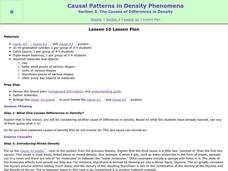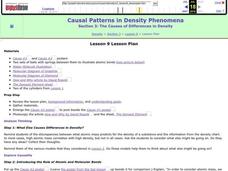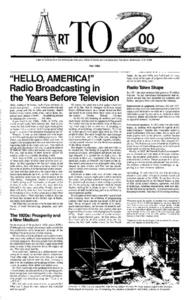Curated OER
Introduction to Density
Seventh graders define density in their own words. In this physics lesson, 7th graders solve density problems using its mathematical formula. They explain why some objects flow and some sink.
Curated OER
Mars Pathfinder
In this science worksheet, learners read about the Mars Pathfinder. Students also answer 2 comprehension questions about the reading.
Curated OER
What brings personal jets to the masses? Lots of computing
Pupils read an article and answer questions. In this jet lesson students rank the problems facing our nation in order from most to least difficult to solve.
Curated OER
Review For Weather Quiz
In this science worksheet, students review the concepts that were previously covered related to weather fronts and other types of systems.
Curated OER
The Causes of Differences in Density
Students explore the causes of differences in density. Students choose objects, measure the mass and volume, and calculate the density of each. They perform additional density experiments to model atoms and their correspondence to...
Curated OER
Lesson 5: Boyle's Law
Learners participate in a lab to verify Boyle's Law using applied force (weight) to do work on a closed isolated system of air. "Elasticity of Gases Apparatus, BASIX" from Sargent-Welch is the syringe apparatus used to measure volume...
Curated OER
Worksheet 24
In this math worksheet, students find how a 1 kg bucket filled with 10 kg of water is lifted 10 m into the air. They set up an integral which gives the total amount of work done on the bucket and the water used for lifting it.
Curated OER
Gas Law Homework Problem Set
In this chemistry worksheet, students determine the mass of the gas when filling a bicycle tire with nitrogen. Then they determine the volume of a balloon when at specific altitudes. Students also determine the partial pressure of oxygen...
Curated OER
A Matter of Fact
Third graders define matter as anything that takes up space and has mass, recognize, through experimentation and observation, that matter exists in three forms, including solid, liquid, and gas, and discuss characteristics of each form...
Curated OER
The Causes of Differences in Density
Students explore what causes differences in density. They observe an models depecting atoms, compounds, and molecules. Students determine if there is air in between atomic bonds. They study the structure and spacing of molecular bonds.
Curated OER
Visualizing Density: Density is Non-obvious
Students explore models of density; wooden balls and marbles discussing whether they think the volume and mass are the same or different. They then compare the density of a loaf of bread that is squished and one that is not compressed.
Curated OER
Gas Law Worksheet II
In this gas laws worksheet, students calculate volume, pressure, or mass for given gas reactions. Students calculate partial pressures for given gases. This worksheet has 17 problems to solve.
Curated OER
Moving Lines
Students gain an introduction to gestural line drawing along with art history correlations. They are encouraged to focus on the energy, mass, and expression of the subject rather than on illustrated replication.
Curated OER
The Ocean: A Watery World
Pupils discuss the proper clothing for the season. They make wind chimes to use as an indicator of movement of the air and observe and identify the various cloud formations. They determine the basic rules of storm safety and discuss...
Curated OER
Ocean Currents
Students examine ocean currents. For this investigative lesson, students examine ocean currents and the relationship between the ocean, our atmosphere, and the weather. They will create a model of an ocean current.
Curated OER
Density
Learners, in groups, design a procedure to calculate the mass of gas molecules in the classroom by measuring the volume of the classroom and researching the density of air. They apply changes in air density with altitude and effects on a...
Curated OER
The Causes of Differences in Density
Students discuss the each of the following objects/substances in terms of what contributes to their density: 1) a piece of copper; 2) a piece of bread; 3) steam in the air. They evaluate the causes in the various densities of substances.
Curated OER
Activity #15 The Cartesian diver
Pupils comprehend that the Cartesian diver is a dropper and the water and air inside it. They vary the volume of the air and the amount of water, the diver can be made to be either more or less dense than water. Pupils squeeze the...
Curated OER
Fun with Balloons
Fifth graders design their own hot air balloon. In this science lesson, 5th graders investigate how factors like weight and sizes affect a balloon's lifting power. They also write math problems based on facts written in the...
Curated OER
Elastic Racquet
Students discover the science behind a tennis racket by looking at a simple toy that works in a similar way. After looking at the related mathematical equations, students experiment with the simple toy to find the spring constant k by...
Curated OER
Determining Momentum and Energy Loss of Balls Colliding Against Different Surfaces
Students experiment with the bounce of balls on various surfaces. In this physics lesson, students use various surfaces to bounce balls to study the momentum. This hands-on activity with the concepts of elasticity of surfaces which is...
Curated OER
Science-Unit on Matter-Gases
First graders understand that gases take up space even though you can't see or smell it. This is done through many experiments like trapping air in different sized bags, using balloons and plastic bottles, and blowing bubbles. They...
Curated OER
The Same but Different Part II
Third graders experiment with beakers of water and balloons to measure the volume of the gas in the balloon. They determine ways to change the volume of air in the balloon which changes its size but not its physical state. By heating the...
Curated OER
Radio Broadcasting Before Television
Students compare the radio to other forms of mass communication. In this Radio Broadcasting Before Television lesson, students learn the different types of radio shows in the 1920s and 30s. Students write and perform radio scripts...
Other popular searches
- Air Masses and Fronts
- Weather Fronts Air Masses
- Cold Air Masses
- Air Masses and Weather
- Weather Air Masses
- Weather Fronts and Air Masses
- Air Masses Oklahoma
- Polar Air Masses
- Air Masses Collide
- Air Masses Fronts
- Air Masses, Fronts
- Air Masses and Air Fronts























